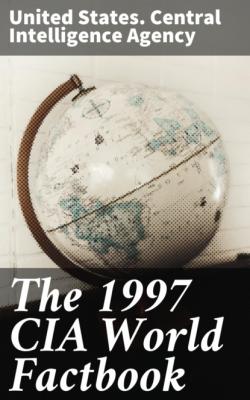The 1997 CIA World Factbook. United States. Central Intelligence Agency
Чтение книги онлайн.
Читать онлайн книгу The 1997 CIA World Factbook - United States. Central Intelligence Agency страница 21
 claims: exclusive fishing zone: 200 nm territorial sea: 20 nm
claims: exclusive fishing zone: 200 nm territorial sea: 20 nm
Climate: semiarid in south and along coast to Luanda; north has cool, dry season (May to October) and hot, rainy season (November to April)
Terrain: narrow coastal plain rises abruptly to vast interior plateau
Elevation extremes: lowest point: Atlantic Ocean 0 m highest point: Morro de Moco 2,620 m
Natural resources: petroleum, diamonds, iron ore, phosphates, copper, feldspar, gold, bauxite, uranium
Land use: arable land: 2% permanent crops: 0% permanent pastures: 23% forests and woodland: 43% other : 32% (1993 est.)
Irrigated land: 750 sq km (1993 est.)
Natural hazards: locally heavy rainfall causes periodic flooding on the plateau
Environment - current issues: the overuse of pastures and subsequent soil erosion attributable to population pressures; desertification; deforestation of tropical rain forest, in response to both international demand for tropical timber and to domestic use as fuel, resulting in loss of biodiversity; soil erosion contributing to water pollution and siltation of rivers and dams; inadequate supplies of potable water
Environment - international agreements: party to: Law of the Sea signed, but not ratified: Biodiversity, Climate Change, Desertification
Geography - note: Cabinda is separated from rest of country by Congo
(Kinshasa)
@Angola:People
Population: 10,548,847 (July 1997 est.)
Age structure: 0–14 years: 45% (male 2,393,009; female 2,327,186) 15–64 years: 52% (male 2,793,038; female 2,753,624) 65 years and over: 3% (male 131,720; female 150,270) (July 1997 est.)
Population growth rate: 3.06% (1997 est.)
Birth rate: 44.11 births/1,000 population (1997 est.)
Death rate: 17.24 deaths/1,000 population (1997 est.)
Net migration rate: 3.69 migrant(s)/1,000 population (1997 est.)
Sex ratio: at birth : 1.05 male(s)/female under 15 years: 1.03 male(s)/female 15–64 years: 1.01 male(s)/female 65 years and over: 0.88 male(s)/female total population : 1.02 male(s)/female (1997 est.)
Infant mortality rate: 135.7 deaths/1,000 live births (1997 est.)
Life expectancy at birth: total population : 47.32 years male: 45.12 years female: 49.64 years (1997 est.)
Total fertility rate: 6.27 children born/woman (1997 est.)
Nationality: noun: Angolan(s) adjective: Angolan
Ethnic groups: Ovimbundu 37%, Kimbundu 25%, Bakongo 13%, mestico (mixed European and Native African) 2%, European 1%, other 22%
Religions: indigenous beliefs 47%, Roman Catholic 38%, Protestant 15% (est.)
Languages: Portuguese (official), Bantu and other African languages
Literacy: definition: age 15 and over can read and write total population: 42% male : 56% female: 28% (1990 est.)
@Angola:Government
Country name: conventional long form : Republic of Angola conventional short form: Angola local long form: Republica de Angola local short form: Angola former: People's Republic of Angola
Data code: AO
Government type: transitional government, nominally a multiparty democracy with a strong presidential system
National capital: Luanda
Administrative divisions: 18 provinces (provincias, singular -
provincia); Bengo, Benguela, Bie, Cabinda, Cuando Cubango, Cuanza
Norte, Cuanza Sul, Cunene, Huambo, Huila, Luanda, Lunda Norte, Lunda
Sul, Malanje, Moxico, Namibe, Uige, Zaire
Independence: 11 November 1975 (from Portugal)
National holiday: Independence Day, 11 November (1975)
Constitution: 11 November 1975; revised 7 January 1978, 11 August 1980, 6 March 1991, and 26 August 1992
Legal system: based on Portuguese civil law system and customary law; recently modified to accommodate political pluralism and increased use of free markets
Suffrage: 18 years of age; universal
Executive branch: chief of state: President Jose Eduardo DOS SANTOS (since 21 September 1979) head of government: Prime Minister Fernando Jose de Franca Vieira Dias VAN DUNEM (since 8 June 1996) cabinet: Council of Ministers appointed by the president elections: President DOS SANTOS originally elected without opposition under a one-party system and stood for reelection in Angola's first multiparty elections in 28–29 September 1992, the last elections to be held, (next to be held NA); prime minister appointed by the president and answerable to the Assembly election results: DOS SANTOS received 49.6% of the total vote, making a run-off election necessary between him and second-place Jonas SAVIMBI; the run-off was not held and SAVIMBI's National Union for the Total Independence of Angola (UNITA) disputed the results of the first election; the civil war was resumed
Legislative branch: unicameral National Assembly or Assembleia Nacional (223 seats; members elected by proportional vote to serve four-year terms) elections: last held 29–30 September 1992 (next to be held NA) election results : percent of vote by party - MPLA 54%, UNITA 34%, others 12%; seats by party - NA
Judicial branch: Supreme Court or Tribunal da Relacao, judges of the
Supreme Court are appointed by the president
Political parties and leaders: Popular Movement for the Liberation of Angola or MPLA [Jose Eduardo DOS SANTOS], is the ruling party and has been in power since 1975; National Union for the Total Independence of Angola or UNITA [Jonas SAVIMBI], is the largest opposition party and engaged in years of armed resistance to the government note: about a dozen minor parties participated in the 1992 elections but won few seats and have little influence in the National Assembly
Political pressure groups and leaders: Front for the Liberation of the Enclave of Cabinda or FLEC note: FLEC is waging a small-scale, highly factionalized, armed struggle for the independence of Cabinda Province
International organization participation: ACP, AfDB, CCC, CEEAC
(observer), ECA, FAO, G-77, IBRD, ICAO, ICRM, IDA, IFAD, IFC, IFRCS,
ILO, IMF, IMO, Intelsat, Interpol, IOC, IOM, ITU, NAM, OAS (observer),
OAU, SADC, UN, UNCTAD, UNESCO, UNIDO, UPU, WCL, WFTU, WHO, WIPO, WMO,
WToO, WTrO
Diplomatic representation in the US: chief of mission: Ambassador Antonio dos Santos FRANCA "N'dalu" chancery: 1050 Connecticut Avenue, NW, Suite 760, Washington, DC 20036 telephone: [1] (202) 785–1156